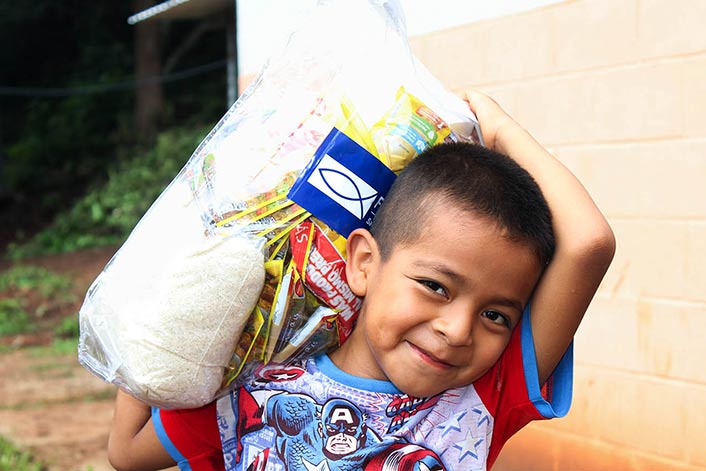Facts About Our Workin El Salvador
Since 1996, Food For The Poor (FFTP) has been working in El Salvador through several partners, including New Horizons For The Poor Foundation, Fundacion Salvadorena para la Salud (Salvadorian Foundation for Health) and Fundación Empresarial Para El Desarrollo Educativo (FEPADE).
There are 18 active projects in El Salvador, including six community development projects, one sustainable community development, four housing projects, one education project, two water projects, three income-generating activities and one creative fulfillment.
FFTP also serves El Salvador through donations of goods. Shipments to El Salvador include agricultural tools, food, medicine, health care items, clothing, shoes, furniture, building materials and educational supplies.
In 2021, FFTP shipped 168 tractor-trailer loads of aid, including food such as beans, rice, and MannaPack rice meals, plus medicine, equipment and health care items.
In 2021, FFTP built 98 homes, for a total of 816 homes since inception, providing families living in poverty with safe shelter, and has completed 10 water projects.
During 2021, in response to the COVID-19 pandemic impact, FFTP donated 3,194 food packages to the most vulnerable families in El Salvador. More than 12,776 beneficiaries from the most impoverished communities in rural and urban area received the packages, which included 15 pounds of rice,15 pounds of beans, 10 pounds of sugar, cornmeal, vegetable oil, spaghetti and cornflakes.
FFTPis in the process of constructing theAyalitas Sustainable Community Development Project, which will benefit 48 families who live in the area. With an average of five members per family, this project will significantly impact the lives of 240 men, women and children. The goal is to strengthen the community by providing the necessary social, economic and governance components to ensure that the residents can flourish on their own.
An estimated 160 people from surrounding communities also will benefit from the Ayalitas Sustainable Community Development Project, which will include:
- Twenty-five homes with water and sanitation components
- An elevated water tank to improve the current system
- School repairs
- A youth center
- A community center and medical clinic
- A recreational area
- Income-generating projects for families
- A life skills training program
- A community empowerment and participation program
- A qualitative and quantitative research program will be implemented to measure if the village is on the path to becoming a self-sustainable community.
FFTP is working to establish an Education and Coexistence program. More than 40,000 students in El Salvador will benefit from this new initiative to transform 100 schools in the most vulnerable communities through a partnership between Food For The Poor and several organizations.
The goal is to transform the schools into Integral Centers for Coexistence and Social Cohesion in a multi-year effort to reduce migration, violence and drop-out rates that plague the country.
The program will include:
- Training 100 principals and 2,000 teachers.
- Strengthening curriculum, focusing on literacy, English, science, technology, engineering and mathematics.
- Renovating schools and providing furniture, computers, books and supplies to enhance students’ learning environment.
- Creating awareness among students, teachers and parents on the danger and negative effects of drug use.
- Providing extra-curricular activities to deter students from gangs, violence and drugs.
- Building a sense of community between schools and municipalities through community activities
FFTP works with nine children’s homes as part of the Angels Of Hope program in El Salvador. Through the AOH program, 219 vulnerable children have shelter in nine homes and are receiving an education.
Several projects are geared toward the production of protein-rich foods such as chickens, laying hens, goats and Pelibuey sheep. These high-protein food sources are important in a population where malnutrition is a common threat.
FFTP’s Technical Center in El Salvador runs in partnership with Nuevo Horizontes Para Los Pobres (FUNHOPO). Since 1996, Food For The Poor shipped more than 56 containers of computer components to the technical center.
The population is approximately 6.5 million residents. The language is Spanish and Catholicism is the largest religion. The Colón was the currency of El Salvador between 1892 and 2001, until it was replaced by the U.S. dollar, the GDP per capita is $8,100.

Key Projects
- Ayalitas Planned Community
- Education and Coexistence
- El Valle Housing